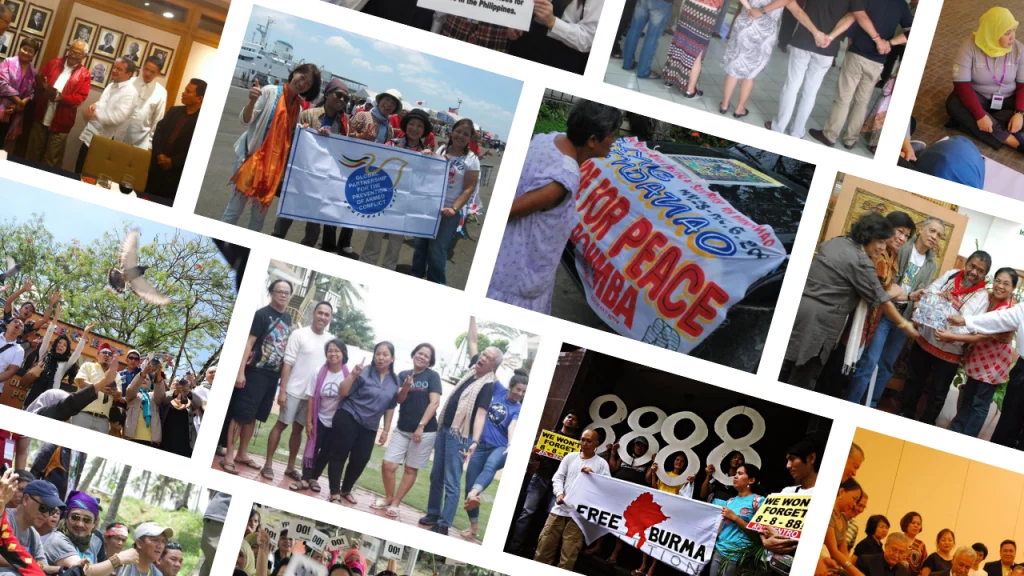
It’s been quite a journey, from being established in 1988 just after the Filipino people ousted a dictator, to today when the forces of that dark era are attempting a political comeback. Sadly with the aid of current forces in power, and tragically, enabled even by some old comrades and friends who were with us fighting the tyrant.
IID was established to share to the rest of the world the rich experiences of the valiant struggle of the Filipino people in reclaiming their freedoms from the dictator Ferdinand Marcos, and to pay forward the solidarity extended to us by other peoples and nations.. It was our way of thanking and giving back to friends outside our country who accompanied us in our darkest days. We can never forget the unselfish solidarity of peoples around the world—including from those who were themselves fighting their own battles.
Thus we started as primarily a solidarity organization. And more specifically, a “south-south solidarity” project. We wanted to focus on harnessing the wisdom and practices among kindred peoples, among kindred souls. Thus we went on to forge networks, coalitions and fronts in support of the self-determination struggles of East Timor, Aceh and West Papua; the democratization of Burma, the end of apartheid in South Africa and the quest for a durable peace in Sri Lanka, Palestine and Latin America.
In 2000, at the instance of an “All-Out War” launched by the then Estrada government, we went back to our home base in the Philippines. The democratization project in the Philippines is still unfinished. Without the self-determination of our Bangsamoro and indigenous siblings, and with the continuing disinclusion and war in Mindanao. In the process and with our partners, we had to also transform, learn and develop our own peacebuilding practice.
We applied the lessons we learned on solidarity in forging alliances within and between civil society and partner communities impacted by armed conflict, and in establishing networks and coalitions between and among Tri-peoples, and between and among Mindanao and the rest of the country. We drew our strength and creativity from the communities themselves, in establishing a grassroots-based ceasefire watch mechanism (Bantay Ceasefire) that would monitor potential clashes among the armed protagonists and report them to their principals that helped contribute to diffusing an impending violence.
Yet we also never forgot that we remain to be an organization forged in reimagining and reinventing what it means to be part of a Southeast Asian community. IID continued engaging the Association of Southeast Asian Nations (ASEAN) in developing conflict prevention mechanisms, each step of the way challenging assumptions on what ASEAN can be and pushing the envelope on ownership and leadership by civil society, communities and peoples of this regionalism project . This we continue to do together with a vibrant regional civil society that has roots in the then solidarity movement for East Timor that IID anchored and the democracy network for Burma that we were a key part of. We are now accompanying younger and not so young activists in the region and around the world in upending the brutal coup in Burma and work for the dawning of a genuine federal democratic society in Burma/Myanmar.
We continue to be inspired and powered by our allies in civil society with their unstinting and respectful commitment to our common aspirations; by our champions within governments, the security sector and policy circles who have not wavered despite the pressure and temptations to yield to inaction or inertia; and most importantly by the examples of our grassroots partners here and abroad — their patient and relentless struggle and resistance. We are heartily grateful to all our donors and supporters from way back till now, who have not wavered in believing and supporting us and the community built around us, and who have allowed us space to experiment, and at times make mistakes in order to learn, apply and do better.
And we continue to be inspired and powered by the dedication and hard work of our countless interns, colleagues and team mates in IID who have come and gone over the years—together with those who have passed on, leaving their respective imprints that have vastly and abundantly made what IID is now:
Bridging Peoples. Building Peace.

Recent Comments